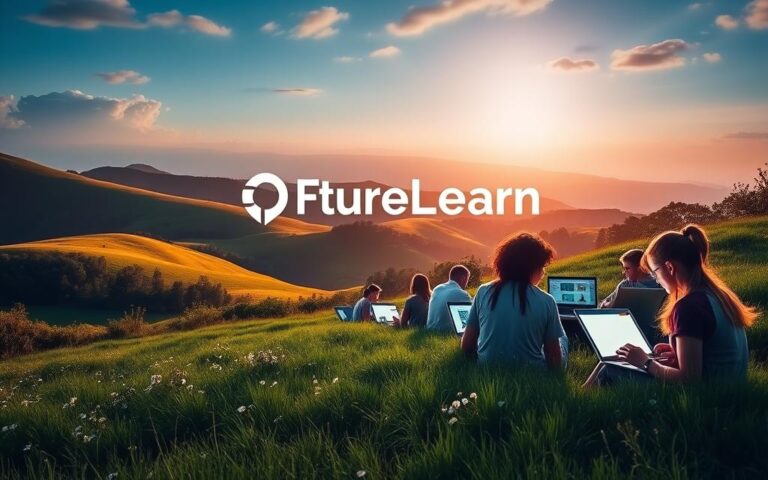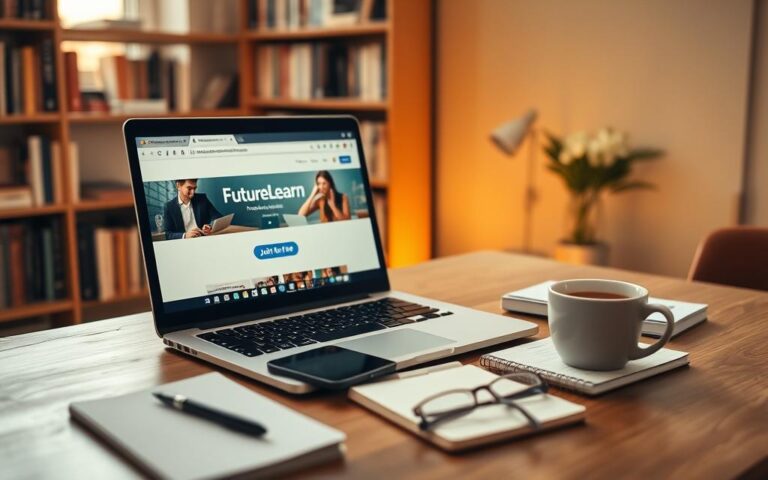Advertisement
Did you know over 77% of public libraries in the U.S. offer eBooks and digital content for free? This shows how many resources are out there for those wanting to learn more without spending a lot.
Libraries are now more than just places to borrow books. They offer eBooks, audiobooks, and online courses for free. With a library card, you can access these materials. This helps create a culture of learning and growth.
Using these resources, you can learn new things, improve your skills, and support your education. All of this is possible thanks to the free digital resources found in local libraries.
Introduction to Free Digital Learning
Libraries have become centers of digital learning, offering many free educational materials and online homeschool resources. This change lets people of all ages learn from home.
Benefits of Free Digital Resources
Using educational materials for homeschooling from libraries has many advantages. First, learners can explore many subjects without spending money. Second, digital resources let people learn at their own speed, fitting different learning styles.
Also, these resources get updated often. This is great for fast-changing subjects like science and technology.
How Libraries Support Lifelong Learning
Libraries are key in supporting lifelong learning. They offer online homeschool resources and a place for community activities. Many libraries run digital literacy programs to help people use digital resources well.

Libraries also keep up with community needs, making sure their digital offerings are useful. This dedication helps people reach their educational goals, no matter their age or background.
Finding Your Local Library’s Digital Offerings
Your local library is more than just a place for books. It’s a doorway to a vast digital world. With digital learning on the rise, libraries now offer eBooks, audiobooks, and online courses. This makes it easy to learn from home.
Using Library Websites and Apps
To start using your library’s digital resources, visit their website or app. Most libraries have special platforms for their digital collections. Here’s how to begin:
- Go to your library’s website and find the digital resources or eResources section.
- Download the library’s app, if there is one, for easier mobile access.
- Use your library card to log in and access digital content.
Many libraries work with big platforms like OverDrive or Hoopla. They offer a wide range of digital materials. This includes free printable worksheets for homeschooling and other educational resources.
Navigating Library Catalogs for Digital Content
Once you’re on the library’s digital platform, finding what you need is easy. You can search by title, author, or subject. Here are some tips to help you:
- Use specific keywords like “homeschooling curriculum materials” in your search.
- Filter your search to show only digital content.
- Check if the digital item you want is available, as popular ones might be on a waitlist.
By following these steps, you can find and use the digital resources your library offers. This will improve your learning experience.
Accessing Free eBooks Through Libraries
Getting eBooks from your library is now super easy. You can find lots of titles to pick from. Libraries have changed to meet your digital needs, offering many eBooks for borrowing. You can find fiction, non-fiction, or digital homeschooling resources at your local library.
Popular eBook Platforms
Libraries work with many eBook platforms to give you a wide choice. OverDrive, Libby, and Scribd are some of the most popular. These services let you browse, borrow, and download eBooks to your device. For homeschooling lesson plans, libraries also offer educational resources and databases.
Each platform has its own special features. OverDrive is easy to use, and Libby is simple and fast. Trying out these platforms can help you find the one you like best.
Borrowing Procedures for eBooks
Borrowing eBooks from your library is easy. First, you need a library card and to sign up for digital services. After that, you can look for eBooks in the library’s catalog or through apps like Libby or OverDrive.
- Search for the eBook you want in your library’s catalog or through the eBook platform’s app.
- Check the availability and borrowing period for the eBook.
- Borrow the eBook, and it will be downloaded to your device.
- Return the eBook by the due date to avoid any late fees, or let it automatically expire.
By following these steps, you can enjoy many eBooks. This includes digital homeschooling resources and help with homeschooling lesson plans. Libraries keep adding new books, so there’s always something new to find.
Enjoying Free Audiobooks via Library Services
Explore the world of free audiobooks through your local library. Libraries now offer a wide range of audiobooks online. This is great for homeschooling families looking for homeschooling tools and resources.
Top Audiobook Providers
Libraries work with top audiobook providers. This gives you access to many audiobooks. Some of the best providers include:
- OverDrive: Offers a huge collection of eBooks and audiobooks to borrow digitally.
- Libby: An app by OverDrive that makes borrowing and listening to library materials easy.
- Hoopla Digital: Provides a wide range of digital content, including audiobooks, eBooks, music, movies, and TV shows.
- Scribd: Gives you access to a huge library of eBooks, audiobooks, and written works for a flat monthly fee. But through libraries, it’s free.
Downloading and Streaming Options for Audiobooks
Library services offer both downloading and streaming for audiobooks. This meets different user needs. You can:
- Download audiobooks for offline listening. This is perfect for commutes or areas with poor internet.
- Stream audiobooks directly from the provider’s platform. This is great for those with stable internet.
Both options are designed to be flexible and convenient. They ensure you can enjoy your favorite audiobooks in a way that fits your lifestyle.
Online Courses Available Through Libraries
Libraries now offer online courses for new hobbies, career growth, or homeschooling. They’ve teamed up with educational platforms to provide a wide range of courses. These courses meet different interests and learning needs.
Variety of Courses
Libraries have online courses on arts, sciences, and professional development. For example, parents can find homeschooling resources for parents to help their kids. These resources include curriculum help, educational activities, and tutorials on specific subjects.
The courses are fun and full of information. They use video lectures, quizzes, and forums for discussion. Whether you want to learn a new language, understand coding, or explore creative writing, your library might have it.
Collaborating Platforms
Libraries team up with top online learning platforms to offer quality content. Some well-known platforms include:
| Platform | Description | Subjects Offered |
|---|---|---|
| Lynda | Offers video courses on business, technology, and creative skills. | Business, Technology, Creative Arts |
| Codecademy | Provides interactive coding lessons. | Computer Programming |
| Rosetta Stone | Language learning platform with interactive lessons. | Languages |
These platforms, along with others, help libraries offer a wide range of learning chances. By using these resources, people can learn new things, improve their skills, and reach their goals.
Tools and Equipment for Digital Learning
To get the most out of free homeschooling materials, you need the right tools. Libraries have lots of digital stuff like eBooks, audiobooks, and online courses. You can access them with the right devices and a little tech know-how.
Devices Compatible with Library Digital Content
You’ll need a device that works with your library’s digital stuff. Libraries support many devices, including:
- eReaders, such as Amazon Kindle or Kobo eReader, for reading eBooks
- Tablets and smartphones for accessing library apps and digital content
- Laptops and desktop computers for online courses and research
It’s important to check with your local library about supported devices and any special needs. Some libraries have their own apps, while others use common platforms.
Tips for Optimal Digital Reading and Listening
With the right device, you can make your digital reading and listening better. For eBooks, adjust the font size and brightness to what feels right. Many eReaders have built-in lights for reading in the dark.
For audiobooks, using headphones can make a big difference, even in loud places. Many apps let you change the playback speed without messing up the narrator’s voice. This helps you get through content faster.
| Device | Primary Use | Tips for Use |
|---|---|---|
| eReader | Reading eBooks | Adjust font size, use built-in light |
| Tablet/Smartphone | Accessing library apps, reading, listening | Use headphones, adjust screen brightness |
| Laptop/Desktop | Online courses, research | Use comfortable keyboard and mouse, adjust display settings |
Choosing the right device and setting it up for comfort lets you enjoy all the digital content your library offers. This includes great free homeschooling materials.
Enhancing Your Learning Experience
Learning more than just digital content is key. It’s about connecting with your community through library programs. Libraries are more than just places to find books. They are lively spots where people of all ages can find resources to learn.
Book Clubs and Community Discussions
Being part of book clubs and discussions is very rewarding. It helps you feel like you belong and share ideas. Libraries have clubs for adults and kids, focusing on different topics.
“Reading is a basic tool in the living of a good life.” – Morris West. This quote shows why book clubs are so important. They help you connect with others and the books you read.
Additional Library Resources and Support
Libraries offer more than just books. They have online courses, digital media, and help for homeschoolers. They work with educational sites to give you top-notch learning materials.
Libraries also provide support like research help and tech access. Many offer free Wi-Fi and computers. Librarians can help you use these resources to learn more.
“The library is a place where you can lose yourself in the pages of a book or find yourself in the company of others who share your interests.”
Using these community resources can make your learning better. You’ll not only learn new things but also feel connected to your community.
Overcoming Common Accessibility Issues
Accessibility is a big deal for libraries. They work hard to make sure everyone can learn easily. This includes people with disabilities.
Ensuring Access for Everyone
Libraries do many things to make digital resources available to all. They offer assistive technologies and make sure their websites work on different devices. For example, they have eBooks and audiobooks that work with screen readers.
To make things better, libraries:
- Follow accessibility guidelines for their digital platforms.
- Provide training and support for users with disabilities.
- Keep their digital resources up to date and accessible.
Tips for Troubleshooting Library Apps
Users might run into problems with library apps, like trouble logging in or app crashes. Here are some tips to help:
- Check your internet connection: Make sure you’re connected.
- Update the app: Use the latest version of the library app.
- Clear cache and data: This can fix problems with old files.
- Contact library support: If you still have trouble, ask for help from the library.
For those using library resources for homeschooling, finding the right materials is key. Libraries have lots of educational materials for homeschooling, like eBooks, audiobooks, and online courses.
| Issue | Troubleshooting Tip |
|---|---|
| Login Problems | Check your library card credentials and ensure the app is updated. |
| Downloading Issues | Clear the app cache and check your device’s storage space. |
| App Crashes | Restart your device and reinstall the app if necessary. |
Conclusion: Embrace Free Digital Learning Today
Free digital learning through libraries can change your life. It’s perfect for those who want to learn more or improve their homeschooling. Libraries have lots of digital resources for personal growth.
Getting Started with Library Resources
Start by visiting your local library’s website or app. Look for eBooks, audiobooks, and online courses. You can download or stream them for learning on the go. This makes learning easy and convenient.
Fostering a Culture of Learning
Use these digital resources to create a learning community. Encourage others to check out library content. Share your own learning stories. Together, we can make learning exciting for everyone.



